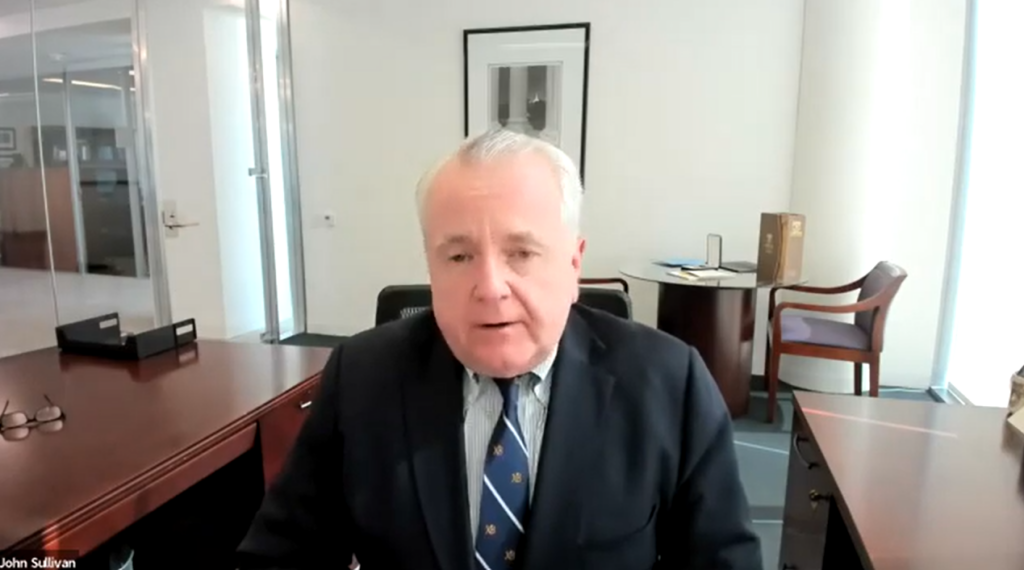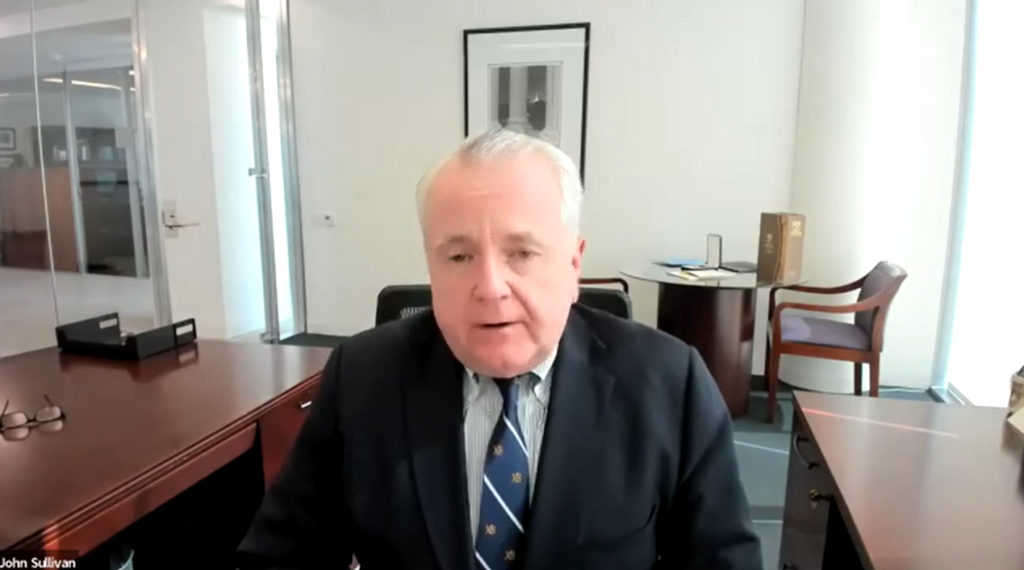Former U.S. Ambassador to the Russian Federation John Sullivan spoke Feb. 21 to Georgetown University students about the ongoing war in Ukraine and Russia’s severed ties with the West.
The Center for Eurasian, Russian and East European Studies (CERES), a department within the School of Foreign Service (SFS), hosted the event. Sullivan, who represented the United States in Moscow under former President Donald Trump and President Joe Biden, spoke about the status of the war a year after its start and its global consequences.
Jill Dougherty, an adjunct professor at CERES who worked as a journalist for over three decades, including as CNN’s bureau chief in Moscow from 1997 to 2005, moderated the discussion.
Dougherty said the Russian invasion of Ukraine, which formally commenced a year ago, impacted the Western world beyond Europe.
“It’s now obvious that Vladimir Putin’s invasion of Ukraine in February, a year ago, and the war that we now are witnessing, is having a profound effect not only on Ukraine, not only on Russia, Europe and the United States, but on global security,” Dougherty said at the event.
The discussion happened after Russian President Vladimir Putin announced that Russia would pull back from the international nuclear arms treaty New START, which former U.S. President Barack Obama and former Russian President Dmitry Medvedev — Putin’s predecessor — signed in 2010. The terms of the treaty aimed to control the number of nuclear warheads that either nation could deploy.
Sullivan said that while the news is noteworthy, people should see its significance in qualified terms given the existing Russian apathy toward the treaty.

“There’s both more to it and less to it than meets the eye,” Sullivan said. “The Russians had already effectively suspended their participation in the New START treaty.”
Sullivan said Putin had already taken action to consolidate Russia’s people into a pro-Putin base, even after the increase in Western sanctions on the Russian Federation after the invasion of Ukraine.
“He himself, though, has been engaged in creating fortress Russia,” Sullivan said. “It’s a project that he has been undertaking since well before the ‘special military operation’ began with crushing independent media, crushing NGOs, civil society, arresting people for speaking out against the ‘special military operation,’ amending the constitution so that he can avoid term limits and continue to serve as president of the Russian Federation until 2036.”
Sullivan said Putin intended for his actions to position Russians against the West in order to promote Russian nationalism.
“Igniting the Russian people into this hardened bastion of Russian culture that he describes and relishes, and rewriting history to justify it — it’s part of a bigger undertaking by the Russian president, who appears to be the Russian president for life,” Sullivan said.
Sullivan said Ukrainians are still looking to rebuild their nation even as the invasion persists. Likewise, Western allies to Kyiv, the capital of Ukraine, are continuing to pledge billions in financial support and advanced weaponry for the nation’s protection.
“We are, in a sense, in the midst of reconstructing Ukraine while the war is ongoing because we’re giving Ukraine assistance to maintain its electrical utilities and so forth, water systems — the most basic needs for life to continue in Ukraine,” Sullivan said.
Sullivan said the strong rapport between Kyiv and the West was in place even before Russia’s invasion of Ukraine, when a November 2021 U.S. delegation to Moscow, led by CIA Director William Burns, informed Russian leaders that the United States had intelligence on Russian plans to invade.
The United States gave a firm warning to Russia that was ultimately ignored but whose bottom line remains relevant, according to Sullivan.
“The second part of the message was, ‘If you do it, the response from the West, led by the United States, will be catastrophic for Russia,’” Sullivan said.






















